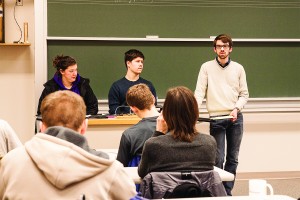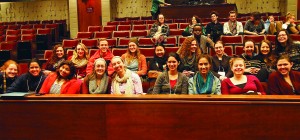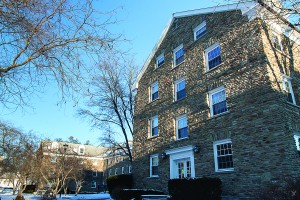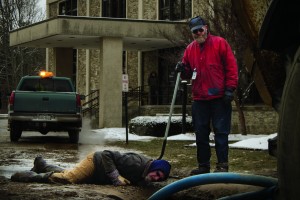Earlier this week, CAB decided to cancel its Houghton’s Got Talent (HGT) event due to lack of student participation (for further elaboration, see “Houghton’s Got Talent Cancelled” on the front page of this issue.) A student life representative came to the Star office that evening to discuss the issues surrounding the cancellation. He posed a question: “Are Houghton students looking to be entertained more than they are looking to be involved?” I think that this is a worthy question to explore and my response would be a resounding “yes.”
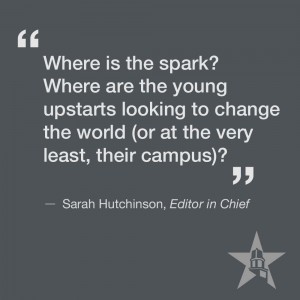 Now, given this specific example, we could talk about the problems of the HGT event itself and why students may not have been very excited to participate in it. For one, the conceptualization of HGT appeared to be much too like SPOT, especially last fall’s SPOT, but with significantly less hype attached to it. For another, it wasn’t very well advertised – consisting of an email announcing auditions over Christmas break, with a few mentions on social media. (And, if you’re like me, you’re much less likely to keep up to date with emails over break, much less think about school.) Finally, though the event was apparently a hit several years ago, there hasn’t been a standing tradition of holding it every year, making students much less likely to participate since they don’t know what to expect.
Now, given this specific example, we could talk about the problems of the HGT event itself and why students may not have been very excited to participate in it. For one, the conceptualization of HGT appeared to be much too like SPOT, especially last fall’s SPOT, but with significantly less hype attached to it. For another, it wasn’t very well advertised – consisting of an email announcing auditions over Christmas break, with a few mentions on social media. (And, if you’re like me, you’re much less likely to keep up to date with emails over break, much less think about school.) Finally, though the event was apparently a hit several years ago, there hasn’t been a standing tradition of holding it every year, making students much less likely to participate since they don’t know what to expect.
These are all important considerations before we could make the catch-all conclusion that students are less inclined to participate campus events and organizations anymore. In fact, as a singular event, we could dismiss the cancellation of HGT as a defining example, given all the problems outlined above. Yet, when we think about it, I think we can see it as part of a larger trend indicating a deadening of student life and participation.
Let’s consider a few more examples. A good example may be the decreasing involvement in student government organizations on campus. This can be seen most notably in the desperate emails pleading students to run for the empty class cabinet positions. It also evident in the SGA elections where there is only one name running on the ballot. Student government organizations appear to be running increasingly on a small group of people, with less input coming from the wider student community. (Be honest, have you ever attended an SGA meeting during your entire college career?)
Even here at the Star, we’ve noticed a drop in participation. Finding writers to take on stories is getting a lot harder than it used to be. This could be due to the drop in enrollment (for example, when I first began working on the paper in my freshman year, enrollment was hovering a little above 1,100, perhaps more; now it is about 900) but I don’t think this explains all of it. Many students that we have emailed seem to be less willing to tackle on important college issues and a little more hesitant at seeing their name in print.
There also seems to be less activism, less response to the changes or events that take place on campus. Always excepting the comment board in the cafeteria, students have been taking weaker stances on college issues and, if they haven’t, they’ve been keeping their opinions to themselves. Here at the Star for example, there have been significantly less letters to the editor and less opinions pieces taking on strong stances about college issues and events. Houghton is in the midst of a great period of change, we have a lot to react to, either in protest or support. For instance, there is the always-problem of low enrollment prompting financial problems, program cancellations, rising tuition, a new athletic complex that is taking on more and more debt – among others. I have yet to see a strong, public student opinion on any of these issues.
Where is the spark? Where are the young upstarts looking to change the world (or, at the very least, their campus)? Again, I think we have become too complacent, looking too much to being entertained. Or maybe it’s not looking to be entertained that’s the problem, but our own apathy.
Let’s fix this. We can revitalize our campus by getting involved – whether it be something like writing a letter to the editor, attending an SGA meeting, drawing up a petition, or even something weird like putting together a juggling act for the school talent show. We can do it.
 The teachers have been familiar with Houghton, and friends with many of the faculty and staff, for many years due to the efforts of the Perm Mission Network (PMN). Susan Hice, former director of Student Academic Services (now known as CASA), along with numerous other Houghton constituents, have traveled to Perm every summer for more than twenty years. According to Daniel Moore, coordinator of audio-visual services and PMN group member, these groups have built an extensive network of friends in the process of ministering to orphanages, schools, businesses, prisons, churches, universities, and summer camps.
The teachers have been familiar with Houghton, and friends with many of the faculty and staff, for many years due to the efforts of the Perm Mission Network (PMN). Susan Hice, former director of Student Academic Services (now known as CASA), along with numerous other Houghton constituents, have traveled to Perm every summer for more than twenty years. According to Daniel Moore, coordinator of audio-visual services and PMN group member, these groups have built an extensive network of friends in the process of ministering to orphanages, schools, businesses, prisons, churches, universities, and summer camps.
